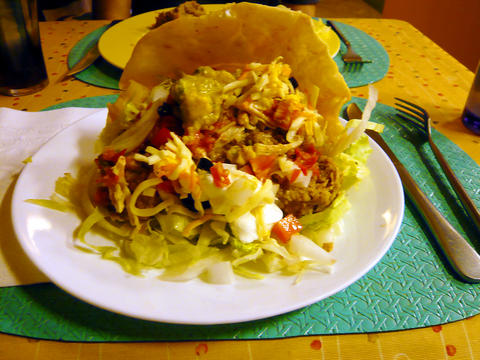La Casita is different than other Mexican restaurants in Taipei - its food actually tastes like Mexican food.
Or, rather, like Tex-Mex food. Mexican food differs from Tex-Mex in the same way that dishes served in many US Chinese restaurants won't be found on menus in Taipei or Shanghai.
That being explained, no other Tex-Mex place in Taipei has gotten it this right. Unlike Tequila Sunrise, the only competitor worth mentioning, La Casita understands that Tex-Mex is a dish best served in hefty portions. Refried beans, for example, should not be an artfully arranged dollop on a mostly empty, rectangular platter. Rather, they should be slathered on one quarter of a large round plate, with the entree and the rice occupying the rest.

PHOTO: RON BROWNLOW, TAIPEI TIMES
The dishes that keep me going back for more are the wet burrito (NT$250) and super burrito (NT$300). These are huge tortillas wrapped around rice, refried beans and your choice of meat (beef or chicken), topped with sour cream, guacamole and salsa. Both are creations of beauty and balance, each bite revealing different textures and combinations of ingredients. These are not dishes to be contemplated. Dig in and hope you finish it before it finishes you.
All the standards - tacos, enchiladas, nachos, etc. - are served here. These can be ordered in combo meals for NT$220 to NT$300. They will fill you up and taste authentic but do not match the triumph that is the super burrito.
La Casita first opened in 1988. It has moved five times, most recently from Jilin Road (吉林路) to its present, cozy little storefront just off Songjiang Road. Inside, adobe-colored walls bear messages and colorful drawings scrawled by satisfied customers. A Frida Kahlo poster keeps watch from the back. The space holds only five or so tables, so call ahead for reservations.
I have always enjoyed the food and found the service friendly and efficient. A review of blogs and Web forums, however, revealed several criticisms. I agree with one: the refried beans are a tad dry, though I don't mind that they're made from pinto beans.
Several posters complained about unfriendly service. After years of visiting La Casita, though, I have yet to see anyone treated rudely. The gripe may be due in part to the fact that one of the owners is a former reporter with a permanently dour expression. He's actually quite friendly if you engage him, speaks some English, and can regale you with interesting stories about his days in Texas and at the United Daily News newspaper.

One of the biggest sore spots in Taiwan’s historical friendship with the US came in 1979 when US president Jimmy Carter broke off formal diplomatic relations with Taiwan’s Republic of China (ROC) government so that the US could establish relations with the People’s Republic of China (PRC). Taiwan’s derecognition came purely at China’s insistence, and the US took the deal. Retired American diplomat John Tkacik, who for almost decade surrounding that schism, from 1974 to 1982, worked in embassies in Taipei and Beijing and at the Taiwan Desk in Washington DC, recently argued in the Taipei Times that “President Carter’s derecognition

This year will go down in the history books. Taiwan faces enormous turmoil and uncertainty in the coming months. Which political parties are in a good position to handle big changes? All of the main parties are beset with challenges. Taking stock, this column examined the Taiwan People’s Party (TPP) (“Huang Kuo-chang’s choking the life out of the TPP,” May 28, page 12), the Democratic Progressive Party (DPP) (“Challenges amid choppy waters for the DPP,” June 14, page 12) and the Chinese Nationalist Party (KMT) (“KMT struggles to seize opportunities as ‘interesting times’ loom,” June 20, page 11). Times like these can

June 23 to June 29 After capturing the walled city of Hsinchu on June 22, 1895, the Japanese hoped to quickly push south and seize control of Taiwan’s entire west coast — but their advance was stalled for more than a month. Not only did local Hakka fighters continue to cause them headaches, resistance forces even attempted to retake the city three times. “We had planned to occupy Anping (Tainan) and Takao (Kaohsiung) as soon as possible, but ever since we took Hsinchu, nearby bandits proclaiming to be ‘righteous people’ (義民) have been destroying train tracks and electrical cables, and gathering in villages

Dr. Y. Tony Yang, Associate Dean of Health Policy and Population Science at George Washington University, argued last week in a piece for the Taipei Times about former president Ma Ying-jeou (馬英九) leading a student delegation to the People’s Republic of China (PRC) that, “The real question is not whether Ma’s visit helps or hurts Taiwan — it is why Taiwan lacks a sophisticated, multi-track approach to one of the most complex geopolitical relationships in the world” (“Ma’s Visit, DPP’s Blind Spot,” June 18, page 8). Yang contends that the Democratic Progressive Party (DPP) has a blind spot: “By treating any